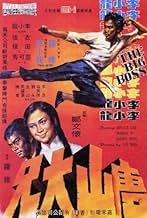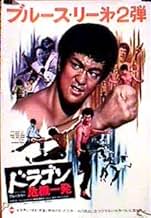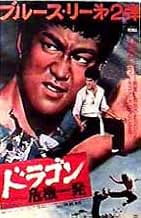IMDb RATING
6.9/10
31K
YOUR RATING
A young Chinese man sworn an oath of non-violence moves to Thailand to work with his cousins in an ice factory, which he discovers to be a front for a sinister heroin-smuggling operation.A young Chinese man sworn an oath of non-violence moves to Thailand to work with his cousins in an ice factory, which he discovers to be a front for a sinister heroin-smuggling operation.A young Chinese man sworn an oath of non-violence moves to Thailand to work with his cousins in an ice factory, which he discovers to be a front for a sinister heroin-smuggling operation.
- Directors
- Writer
- Stars
James Tien
- Hsiu Chien
- (as Paul Tien)
Nora Miao
- Drinkstand owner
- (as Miao Ke Hsiu)
Ying-Chieh Han
- Hsiao Mi (Boss Mi)
- (as Han Ying Chieh)
Hua-Sze Li
- Ah Chai
- (as Li Hua Sze)
Marilyn Bautista
- Miss Wuman
- (as Malalene)
Billy Chan
- Ah Pei
- (as Hui-yi Chen)
Chia-Chen Tu
- Third Uncle
- (as Ka-ching To)
- Directors
- Writer
- All cast & crew
- Production, box office & more at IMDbPro
Featured reviews
Saw this in a theatre in 1971 and just revisited it 45 years later.
Conclusion:
As a film, it suffers badly from the massive improvements in choreography, skill, and staging that MA films have enjoyed in the interim. What seemed sort of "OK" in a dark theatre in 1971 becomes, after several decades, almost a slow dance of awkward fighting moves, with off-sync sound effects and blows that never seem to connect with anything.
In this instance it is not fair to judge the old by the new ... so, no rating.
And then there is the topic of Mr. Lee.
History tells us that Bruce Lee exploded into Asian cinema on this film and anyone can see why. IT IS AS IF HE IS OPERATING AT A FAST CAMERA SPEED AND THE REST OF THE CAST AT A SLOW CAMERA FEED. Of course, the speed of the camera is the same throughout, it is the speed of the actors that differed.
The cast were the usual bunch that made many dozens of these films in a year. They looked slow and awkward because they actually were slow and awkward.
Mr. Lee on the other hand lived (and ultimately died) for his craft. His whole life was MA and even today the debate continues as where he would have ranked against the best fighters of all time. At the top is my guess.
In essence, this is almost an audition tape for Mr. Lee and not much else. But it is a piece of history and deserves great respect.
Conclusion:
As a film, it suffers badly from the massive improvements in choreography, skill, and staging that MA films have enjoyed in the interim. What seemed sort of "OK" in a dark theatre in 1971 becomes, after several decades, almost a slow dance of awkward fighting moves, with off-sync sound effects and blows that never seem to connect with anything.
In this instance it is not fair to judge the old by the new ... so, no rating.
And then there is the topic of Mr. Lee.
History tells us that Bruce Lee exploded into Asian cinema on this film and anyone can see why. IT IS AS IF HE IS OPERATING AT A FAST CAMERA SPEED AND THE REST OF THE CAST AT A SLOW CAMERA FEED. Of course, the speed of the camera is the same throughout, it is the speed of the actors that differed.
The cast were the usual bunch that made many dozens of these films in a year. They looked slow and awkward because they actually were slow and awkward.
Mr. Lee on the other hand lived (and ultimately died) for his craft. His whole life was MA and even today the debate continues as where he would have ranked against the best fighters of all time. At the top is my guess.
In essence, this is almost an audition tape for Mr. Lee and not much else. But it is a piece of history and deserves great respect.
i liked this film.it's very entertaining.the story is engaging enough to keep you interested.the fight scenes are very good.especially the final fight between Bruce Lee's character and The Big Boss.Lee had a lot of charisma and screen presence and it shows here on his first big feature film role.what really impressed about him though while watching the film was his amazing footwork in the fight scenes.he was obviously a very skilled martial artist.the version i viewed was the U.S. 99 minute version.it would be interesting to see the uncut version,if it still exists anywhere.but for now,this version will have to do.for me,Tang shan da xiong is a 7/10
Cheng Chao-an (Bruce Lee) leaves his Chinese village to join relatives in Thailand. He is greeted by cousin Hsiu Chien who readily fights for others while Cheng promised his mother never to fight again. He joins his relatives at an ice factory owned by drug-lord big boss Hsiao Mi. When two of his cousins find drugs hidden in the ice, they are offered money but they politely refuse. They are killed and their bodies chopped up. Hsu Chien and Ah Pei go to ask questions but then they disappear. The men riot and Cheng is made foreman to appease them. Chiao Mei berates them for forgetting her brother. The boss throws him a party to get him drunk. Chiao Mei runs into him sneaking out of the brothel and the men are not happy that he forgot about Hsu Chien once again. Eventually, the hooker Sun reveals the truth and is killed. The boss's henchmen attack Chiao Mei and the family while Cheng is breaking into the factory. He finds drugs and the hidden bodies. He's confronted by the boss's son and numerous henchmen.
It's a functional kung fu story. The idea that he promised not to fight is great one. It allows him to be on another level when he actually does fight. It also allows him to be human. He gets tricked by the boss. He falls for a hooker. He's restrained by his promise. That makes the fights so much better. It's like he had saved all of his energy for his big fights. The movie is also more brutal and bloodier than I expected. The main thing is that this is a Bruce Lee movie and he shows that he's obviously a superstar. He's burning with charisma and it comes across on the screen.
It's a functional kung fu story. The idea that he promised not to fight is great one. It allows him to be on another level when he actually does fight. It also allows him to be human. He gets tricked by the boss. He falls for a hooker. He's restrained by his promise. That makes the fights so much better. It's like he had saved all of his energy for his big fights. The movie is also more brutal and bloodier than I expected. The main thing is that this is a Bruce Lee movie and he shows that he's obviously a superstar. He's burning with charisma and it comes across on the screen.
After years of trying to get into Hollywood, Bruce Lee returned to Hong Kong and began his efforts with this low-budget martial-arts thriller. The result - an Asian box-office smash which made Lee an overnight sensation in the East. Whilst its not a great film or Lee's best work, it is an definite film classic that really opened the door for the martial-arts genre, as well as kicking off Lee's career. The story sees Lee coming to work in Banghok with his cousins in an ice factory, where he soon discovers sinister operations taking place under the thumb of the title villain. Like Lee's other films, the action builds up through the film to impressively staged fight scenes, all topped by a dramatic, all-out climatic bout between Lee and the Big Boss. Breakthrough stuff but the best (and the West) was yet to come.
Fists Of Fury was the second best of the Lee films. (Chinese Connection was tops). The speed, action and excitement in the film was unprecedented. The only thing that came close were the episodes of the Green Hornet and they were Lee also. He was the epitome of being physically fit and had screen presence like no action star before him. His fitness level and physical capabilities are qualities that some action stars have today, but at the time there was no one like him. Fists of Fury had a good story and the acting was good. In the last almost thirty years, you will be able to find films that are equivalent to the technical and production measures of this film, but none as good due to the fact that this was the first.
DHM
DHM
Did you know
- TriviaBruce Lee endured "two days of hell" when he sprained his ankle badly while landing awkwardly from a jump from a high jump on a slipped mattress, and had to be driven to Bangkok to see a doctor, where he caught a virus in the hot and stuffy conditions. Close-ups were used to finish the fight, as Bruce struggled and had to drag his leg, which was covered up by, and contributed to, his character's worn out, exhausted appearance. He couldn't move properly and was also racked with aches and fever and was having difficulty keeping food down. Even so, filming continued. His twisted ankle meant that he had to drag his injured leg, so in several scenes he had to be filmed in closeup. He also broke a glass in his hand, resulting in a gash that required ten stitches. While at the hospital in Bangkok, he caught flu and rapidly lost ten pounds.
- GoofsWhen the guard dogs leap at Cheng, they are obviously thrown.
- Quotes
Cheng Chao-an: Just keep away. Go on. It's not your fight.
- Alternate versionsWhen the film was released in the United States, the death of Hsiao Mi, "The Boss", was cut down to him simply being stabbed in the chest with a knife in order to receive an "R" rating. The original version of his death, which not only shows an explicit close-up of the knife in his chest but Cheng Chao-an's fingers piercing his rib cage and blood flowing from under his shirt, would have given the film an "X" rating. This scene has since been restored for the Bruce Lee Ultimate Collection DVD released by Fox, and the Shout Factory DVD/Bluray releases.
- ConnectionsEdited into Le Jeu de la mort (1978)
Details
Box office
- Budget
- $100,000 (estimated)
Contribute to this page
Suggest an edit or add missing content




































